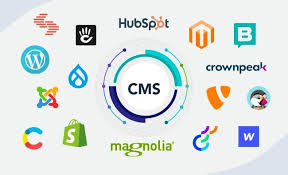In the digital age, managing online content efficiently is paramount to success. Content Management Systems (CMS) play a central role in facilitating this process, empowering businesses to create, organize, and publish content seamlessly. This blog delves into the world of Content Management Systems and explores their benefits, key features, and how they can revolutionize your online presence.
Understanding Content Management Systems: A Foundation for Digital Success
Content Management Systems serves as the foundation for websites, providing a centralized platform for creating, editing, and organizing digital content. Key components of CMS include:
- Content Creation: Content Management System platforms offer intuitive interfaces for creating various types of content, from articles and blog posts to multimedia content such as images and videos.
- Content Organization: CMS platforms boast robust organizational features such as categories, tags, and metadata. These systems allow users to efficiently structure and categorize content for easy navigation and searchability.
- Content Publishing: Content Management Systems streamline the publishing process. This further enables users to schedule content publication, manage revisions, and control access permissions for multiple users.
Benefits of Using Content Management Systems
Implementing a Content Management System offers numerous benefits for businesses looking to streamline their online presence:
- Ease of Use: Content Management Systems feature user-friendly interfaces and what you see is what you get in terms of how it is edited. This makes it easy for users with varying technical expertise to create and manage content.
- Time and Cost Savings: By simplifying content creation, management, and publishing processes, Content Management Systems help businesses save time and resources that would otherwise be spent on manual tasks.
- Scalability: Content Management Systems are highly scalable, and adaptable. Meaning that businesses gain the ability to easily expand their website’s functionality and accommodate growing content needs as their business evolves.
Choosing the Right CMS: Factors to Consider
When selecting a CMS for your business, it’s essential to consider various factors:
- Ease of Use: Look for a CMS that offers an intuitive interface and robust editing tools to streamline content creation and management tasks.
- Customization Options: Assess the flexibility of the chosen CMS on the basis of design customization, plugin integration, and potential scalability to meet your specific business needs.
- Support and Community: Consider the level of support and documentation available for that CMS, as well as the size and activity of the user community for ongoing assistance and development resources.
Popular Choices for a CMS: Exploring Options
Several CMS platforms dominate the market, each offering unique features and capabilities:
- WordPress: WordPress is the tool that actually powers this current website and helps manage and organize all the content. Known for its user-friendly interface and extensive plugin ecosystem, WordPress powers millions of websites worldwide, from blogs and small business sites to large enterprise solutions.
- Drupal: Drupal boasts a robust architecture and flexibility. It is favored by developers for the purpose of building complex and highly customizable websites. This makes it ideal for large-scale projects and enterprise-level applications.
- Joomla: Joomla is another tool, and it strikes a balance between ease of use and customization. Therefore, making Joomla a popular choice for smaller to medium-sized businesses and organizations looking for a versatile CMS solution.

Relevant Blog Post
Cornerstone Content: Digital Marketing Technology
Elevating Your Online Presence with CMS Platforms
Content Management Systems simplify content creation, organization, and publishing. Moreover, they empower the dynamic online presence for a business. By understanding the benefits of these systems, considering key factors when trying to choose the right platform, and exploring popular options, businesses can take advantage of the power of CMS platforms to streamline their digital operations and drive success in the ever-evolving digital landscape.
